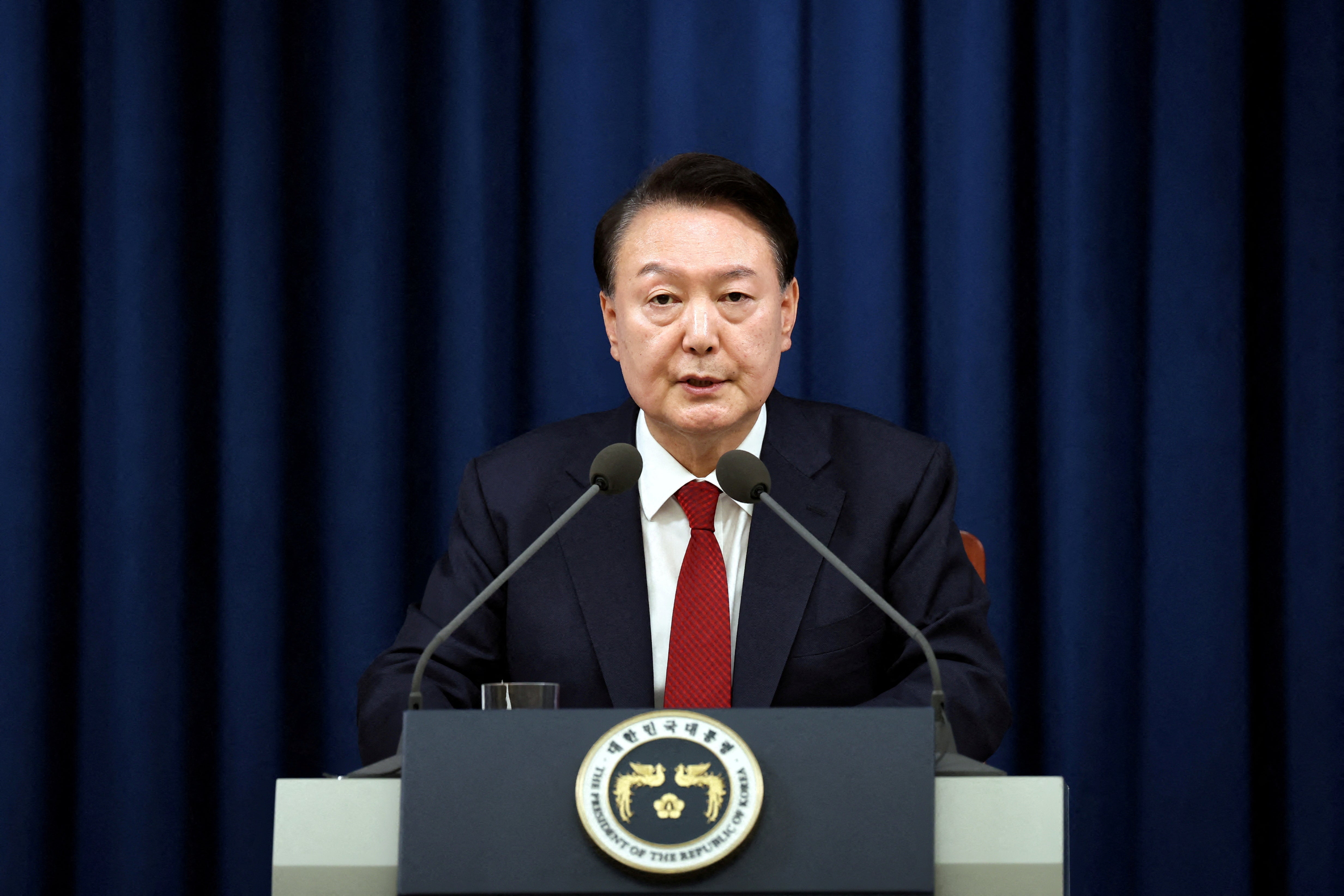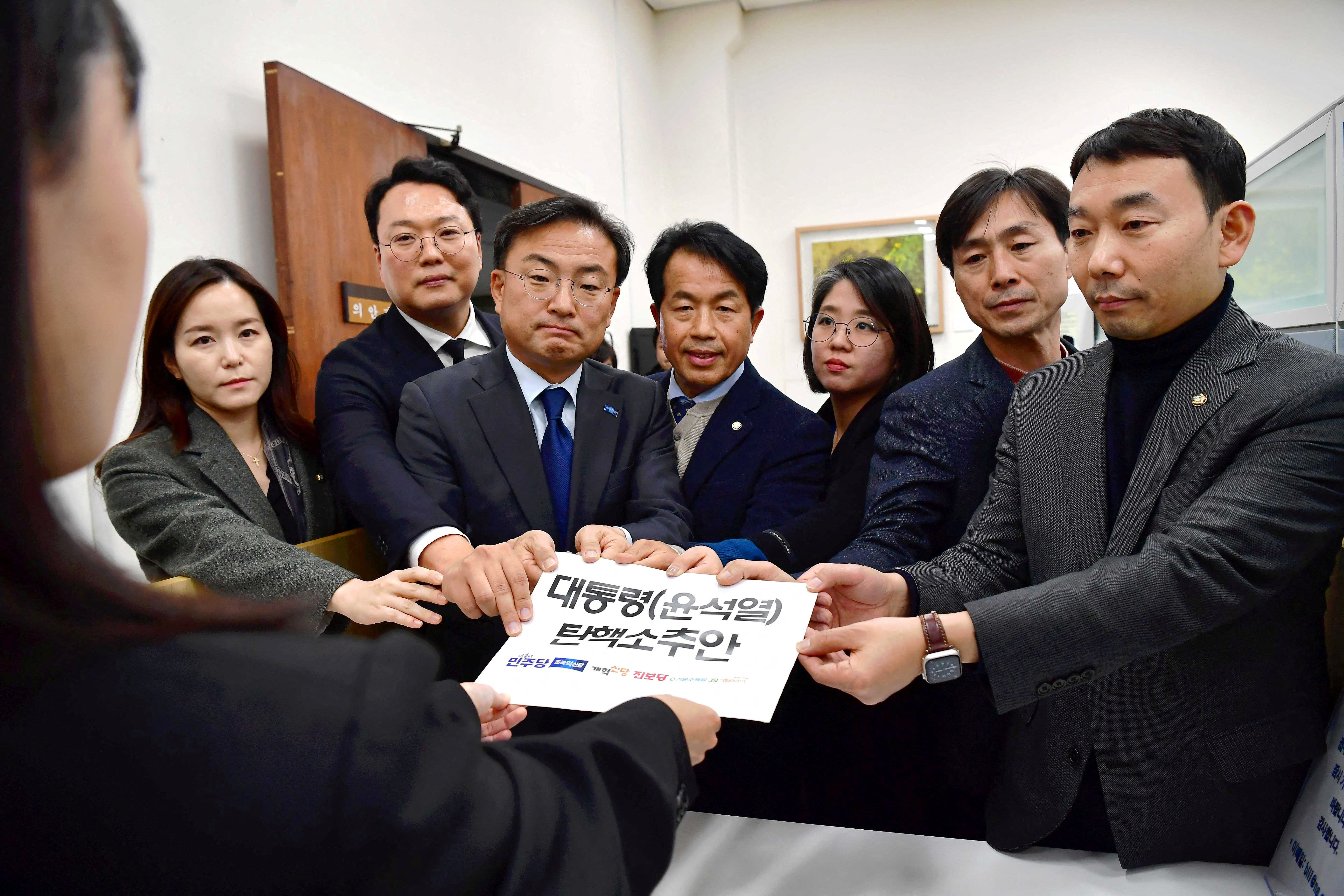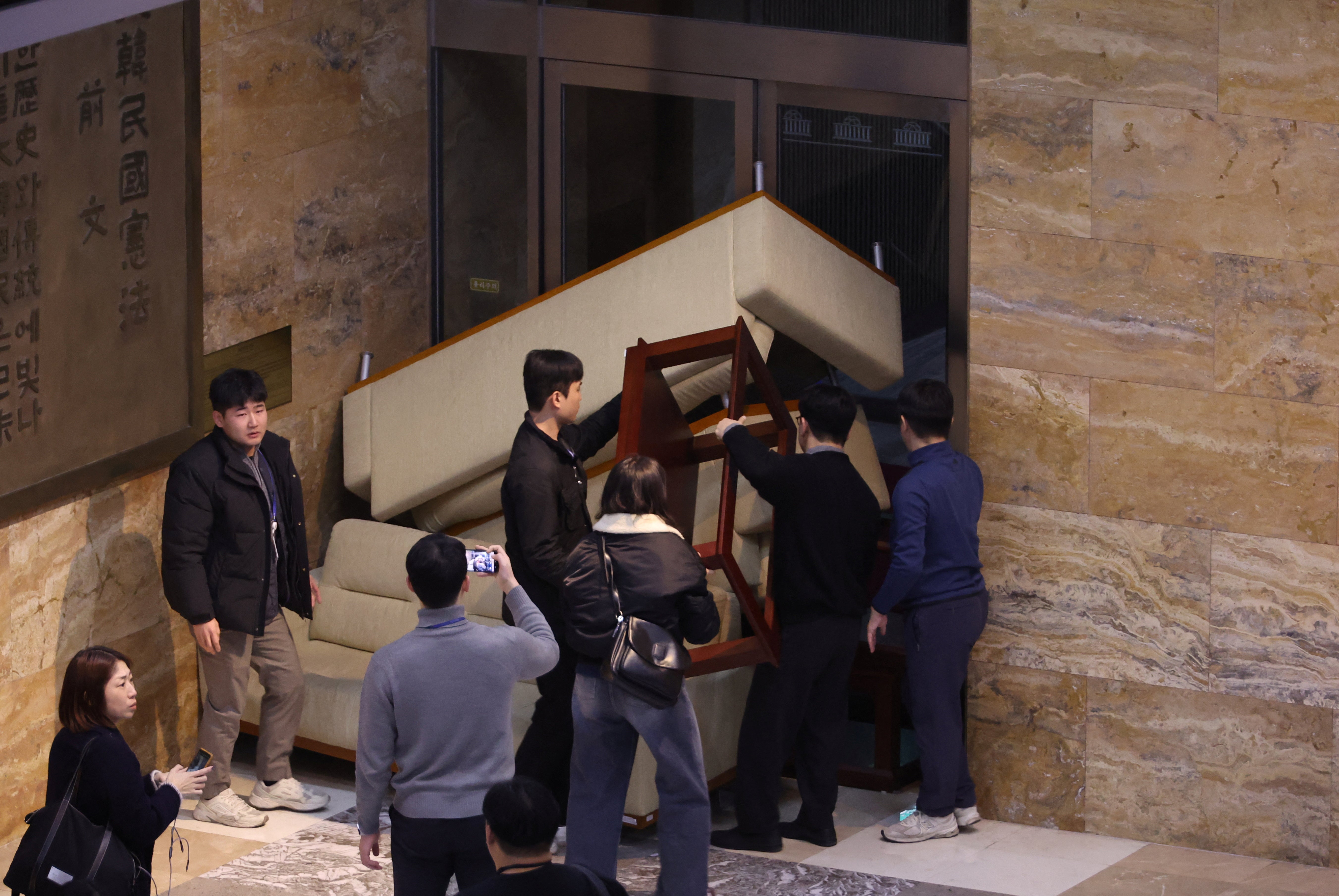South Korea’s president faces impeachment over martial law chaos as defence minister offers to resign
The vote to impeach Yoon Suk Yeol could take place as soon as Friday following the shock bid to impose martial law

South Korean president Yoon Suk Yeol faces impeachment proceedings over his short-lived bid to impose martial law which brought chaos to Seoul – and has been condemned as “insurrectionary behaviour” by opposition parties.
Mr Yoon rescinded the declaration shortly after MPs gained access to the country’s parliament in the early hours of Wednesday morning to vote against the authoritarian measures despite a stand-off with the military. Armed troops had forced their way into the National Assembly building in Seoul but stood back when parliamentary aides sprayed them with fire extinguishers. MPs rejected the martial law decision while protesters scuffled with police outside.
“We can no longer allow democracy to collapse. The lives and safety of the people must be protected,” said Kim Yong Jin, a member of the main opposition Democratic Party’s central committee.
The Democratic Party also said it wants to charge Mr Yoon with “crimes of rebellion”. It named defence minister Kim Yong Hyun and interior minister Lee Sang Min as “key participants” of the martial law declaration, saying it also wanted them charged alongside Mr Yoon.
On Wednesday, Mr Kim tendered his resignation and said he would take full responsibility for the martial law. He apologised to the public for spreading confusion and causing distress, the Defence Ministry said in a statement.
However, crowds again took to the streets in a candlelit vigil on Wednesday night to call for Mr Yoon’s resignation – a reminder of the massive protests that led to the impeachment of former president Park Geun Hye in 2017.
In declaring martial law in a shock late-night television address on Tuesday, Mr Yoon vowed to eliminate “anti-state” actors he accused of sympathising with North Korea.
Within hours, South Korea’s parliament, with 190 of its 300 members present, unanimously passed a motion for martial law to be lifted, with 18 members of Yoon’s party present. The president then rescinded the declaration of martial law, around six hours after its proclamation.
“We’ve submitted an impeachment motion prepared urgently,” representatives from the six opposition parties said on Wednesday, indicating the vote could happen as soon as Friday.
To succeed, it would require a two-thirds majority in parliament and the approval of at least six justices from the Constitutional Court. Should impeachment proceedings succeed, Mr Yoon would be suspended from office while the Constitutional Court scrutinises and ratifies the motion, a process that could take up to six months.


In the interim, prime minister Han Duck Soo would assume presidential duties.
When he was elected in 2022, Mr Yoon had been embraced by leaders in the West as a partner in the US-led effort to unify democracies against growing authoritarianism in China, Russia and elsewhere. But he caused unease among South Koreans by branding his critics as “communist totalitarian and anti-state forces” as his approval ratings slipped. In November, he denied wrongdoing by him and his wife, first lady Kim Keon Hee, in response to influence-peddling allegations against the pair.
In declaring martial law, Mr Yoon cited a motion by the Democratic Party earlier this week to impeach some of the country’s top prosecutors over a failure to investigate the first lady as well as its rejection of a government budget proposal.
South Korea’s ministers on Monday protested the move by the Democratic Party to slash more than 4 trillion won (£2.3bn) from the government’s budget proposal. Mr Yoon said that action undermined the essential functioning of government.
The political chaos has created deep divisions in the president’s ruling People Power Party, as its chair called for the entire cabinet to resign.


Mr Yoon’s senior aides, including chief of staff Chung Jin Suk and national security adviser Shin Won Sik, have also tendered their resignations. Whether these will be accepted by the president is unclear.
The presidential office has defended the initial decision to declare martial law as “strictly within [the country’s] constitutional framework”. It said on Wednesday that the announcement was timed to “minimise damage” to the economy and people’s lives.
Protesters gathered at Gwanghwamun Square and outside the National Assembly on Wednesday, holding placards with messages such as “Restore Democracy” and “Investigate his act of rebellion immediately”, with the march turning into a candlelit vigil during the night.
It followed dramatic scenes from early that morning, with CCTV footage revealing chaotic scenes of staffers using sofas and fire extinguishers inside the parliamentary building to block soldiers armed with assault rifles and night-vision goggles from entering the National Assembly.
Helicopters deployed armed troops to parliament, while others scaled fences and smashed windows after midnight, assembly secretary general Kim Min Ki said.
Outside, footage was also recorded of a journalist turned lawmaker, Ahn Gwi Ryeong, grabbing the gun of a soldier. “I didn’t think… I just knew we had to stop this,” she told the BBC Korean Service.

Mr Yoon’s actions have drawn comparisons to South Korea’s authoritarian era before the 1980s. The sight of military helicopters and armed soldiers near the parliament evoked memories of the military regimes. Analysts warn that such actions undermine the country’s hard-won democratic principles.
The events drew grave concern from global leaders, with Sweden’s prime minister Ulf Kristersson and Japan’s defence minister Gen Nakatani postponing their visits, and the US and UK issuing safety warnings to citizens visiting the country.
US secretary of state Antony Blinken told a press conference at a Nato gathering in Brussels on Wednesday that it was important for South Korea to resolve its internal political turmoil quickly, but said that the country was still a democratic success story.
“Korea is one of the most powerful stories in the world about the emergence of democracy and democratic resilience, and we’ll continue to look to Korea to set that example,” he said.
Washington had no advance notice of the decision, Mr Blinken told Reuters, adding that he expected to speak with his South Korean counterpart in the coming days.
Join our commenting forum
Join thought-provoking conversations, follow other Independent readers and see their replies
Comments
Bookmark popover
Removed from bookmarks